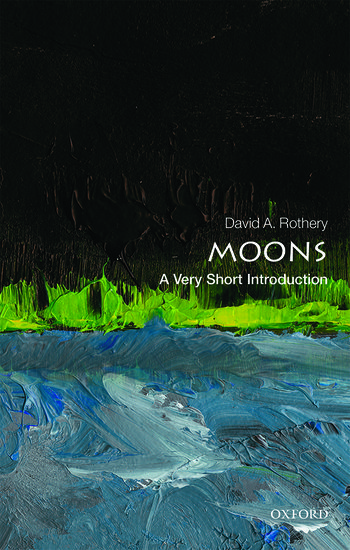Home >
A Very Short Introduction >
Moons (Science)
A Very Short Introduction | Science
Moons
ISBN: 9780198735274
Series: A Very Short Introduction
Moons (Science)
A Very Short Introduction Moons (Science) Media > Books > Non-Fiction > Education Books Expect Delays of Up to 4 Weeks| Order Below |
ISBN
9780198735274 (10-digit ISBN: 0198735278)
- Description
- Key Features
- Series Description
- Table of Contents
- Introduces the reader to the moons of our Solar System, their discovery and naming
- Explains the nature and influence of our Moon
- Provides an up to date account detailing what we know about the nature and formation of other planets' moons from Voyager, Galileo, and other spacecraft
Proving to be both varied and fascinating, moons are far more common than planets in our Solar System. Our own Moon has had a profound influence on Earth, not only through tidal effects, but even on the behaviour of some marine animals. Many remarkable things have been discovered about the moons of the giant outer planets from Voyager, Galileo, Cassini, and other spacecraft. Scientists have glimpsed volcanic activity on Io, found oceans of water on Titan, and captured photos of icy geysers bursting from Enceladus. It looks likely that microbial life beyond the Earth may be discovered on a moon rather than a planet.
In this Very Short Introduction David Rothery introduces the reader to the moons of our Solar System, beginning with the early discoveries of Galileo and others, describing their variety of mostly mythological names, and the early use of Jupiter's moons to establish position at sea and to estimate the speed of light. Rothery discusses the structure, formation, and influence of our Moon, and those of the other planets, and ends with the recent discovery of moons orbiting asteroids, whilst looking forward to the possibility of finding moons of exoplanets in planetary systems far beyond our own.
Oxford's Very Short Introductions series offers concise and original introductions to a wide range of subjects--from Islam to Sociology, Politics to Classics, Literary Theory to History, and Archaeology to the Bible.
Not simply a textbook of definitions, each volume in this series provides trenchant and provocative--yet always balanced and complete--discussions of the central issues in a given discipline or field. Every Very Short Introduction gives a readable evolution of the subject in question, demonstrating how the subject has developed and how it has influenced society. Eventually, the series will encompass every major academic discipline, offering all students an accessible and abundant reference library.
Whatever the area of study that one deems important or appealing, whatever the topic that fascinates the general reader, the Very Short Introductions series has a handy and affordable guide that will likely prove indispensable.
Please note: As this series is not ELT material, these titles are not subject to discount.
1: The discovery and significance of moons
2: The Moon
3: The Moon's influence on us
4: The moons of giant planets
5: Giant planet regular satellites in close up
6: The moons of Mars - captured asteroids
7: Moons of small bodies
8: Moons in other planetary systems: exomoons
Further Reading
Index
Proving to be both varied and fascinating, moons are far more common than planets in our Solar System. Our own Moon has had a profound influence on Earth, not only through tidal effects, but even on the behaviour of some marine animals. Many remarkable things have been discovered about the moons of the giant outer planets from Voyager, Galileo, Cassini, and other spacecraft. Scientists have glimpsed volcanic activity on Io, found oceans of water on Titan, and captured photos of icy geysers bursting from Enceladus. It looks likely that microbial life beyond the Earth may be discovered on a moon rather than a planet.
In this Very Short Introduction David Rothery introduces the reader to the moons of our Solar System, beginning with the early discoveries of Galileo and others, describing their variety of mostly mythological names, and the early use of Jupiter's moons to establish position at sea and to estimate the speed of light. Rothery discusses the structure, formation, and influence of our Moon, and those of the other planets, and ends with the recent discovery of moons orbiting asteroids, whilst looking forward to the possibility of finding moons of exoplanets in planetary systems far beyond our own.
Key Features
- Introduces the reader to the moons of our Solar System, their discovery and naming
- Explains the nature and influence of our Moon
- Provides an up to date account detailing what we know about the nature and formation of other planets' moons from Voyager, Galileo, and other spacecraft
Series Description
Oxford's Very Short Introductions series offers concise and original introductions to a wide range of subjects--from Islam to Sociology, Politics to Classics, Literary Theory to History, and Archaeology to the Bible.
Not simply a textbook of definitions, each volume in this series provides trenchant and provocative--yet always balanced and complete--discussions of the central issues in a given discipline or field. Every Very Short Introduction gives a readable evolution of the subject in question, demonstrating how the subject has developed and how it has influenced society. Eventually, the series will encompass every major academic discipline, offering all students an accessible and abundant reference library.
Whatever the area of study that one deems important or appealing, whatever the topic that fascinates the general reader, the Very Short Introductions series has a handy and affordable guide that will likely prove indispensable.
Please note: As this series is not ELT material, these titles are not subject to discount.
EASY ORDER FORM
PRICES LISTED INCLUDE CONSUMPTION TAX
Price Before Tax:
¥1,790


